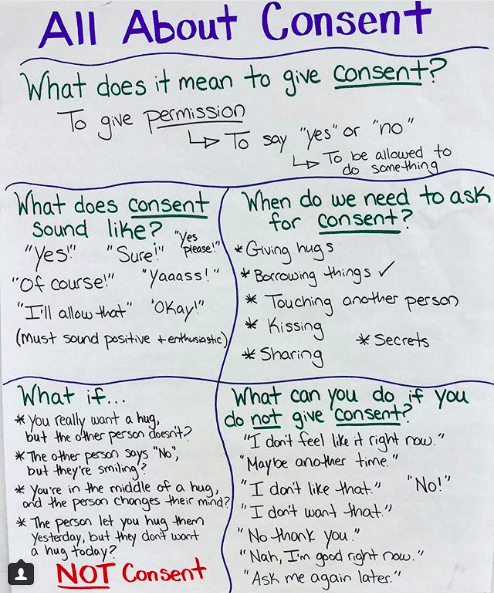Consent is a relatively recent term, at least to this almost-forty-year-old woman, but the concept definitely is not. I grew up before the “no means no” campaign, before the word consent emerged as the proper way to define when any type of sexual interaction should take place – but, that said, it’s not a new idea that both parties involved in such encounters should be enthusiastically for it before, during, and after said act takes place.
It seems, however, that a disturbing number of people aren’t aware – or claim they were not aware – that such a societal construct has always been in place.
Consent is, however, necessary. If you or someone you know is struggling to understand why it’s important and what, exactly, it looks like in definition and practice, then this third grade teacher has your back.
Elizabeth Kleinrock, curator of the website Teach and Transform, sees herself as more than a teacher – she’s a self-proclaimed “social justice advocate” and “anti-bais educator.”
Luckily, the way she’s come up with to teach children about consent is much simpler than the way she describes her job. Brilliantly simple, even. Take a look.

Image Credit: Instagram
First up, she defines the concept in simple terms. Next, she explains just what enthusiastic consent sounds and feels like when you’re giving or receiving it, and outlines all of the scenarios in which third graders might be in a position when they need to ask before taking an action.
In the bottom third of her chart is what is not consent – here, she addresses more complex concepts like someone’s body language not matching their words, someone changing their mind after giving consent, and someone who approved an action previously but who now doesn’t want it.
She also helps kids come up with simple phrases and ways to decline a request that they’re not receptive to or that makes them uncomfortable.
Boom. Done, and in one simple chart. Hang it on your wall. Share it with your own children. Put it up in your cubicle at work, if you think it’s needed.
Share, share, share.
